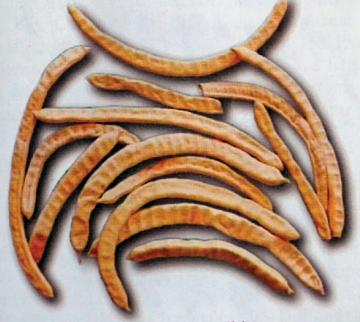
Vilayati babul pods (Prosopis juliflora)
Common names: Algaroba, Mesquite
Local names: Hindi: Junglee kikar, Vilayati babul
Prosopis juliflora is native to Peru, Chile and Argentina. It has been introduced in Asia and Africa and is now wide spread in the semi arid areas of the world. In many areas, it is considered a weed. It is a drought resistant deciduous thorny shrub or small tree up to 12 m tall and has been planted in dry areas of the country.
Availability
About 1 million tones vilayati babul is available annually in India and about 0.2 million tones pods are available per annum for animal feeding.
Nutritive value
Babul pods are very good source of energy (TDN 65%). It contains about 12% CP.
Deleterious factor
The pods contain about 0.74 to 1.5% tannins which is very low and does not produce any harmful effect on animal. The material is not known to contain any other toxic substance.
Inclusion
The pulp of the pods contains about 20-30% water soluble sugars, most of which is sucrose; hence the pods are greatly relished by the livestock. High soluble carbohydrate content of pods also acts as binding agent in pellet making. Livestock poisonings has been reported from pods eaten after exposure to rain (FAO, AFRIS). Only ripe pods should be fed, as the green pods are bitter and have little feed value. Vilayati babul pods should not be used as such as its seeds are very hard so animal cannot digest it and comes out as such with faeces. Therefore, it should be fed after grinding. The ground pods can be incorporated at 20% level in the concentrate mixture of crossbred calves (Punj, 1988). These can be included at 30% level in the concentrate mixture of lactating cows and 45% level in the ration of adult bullocks (Talpada et al., 2002). Studies indicated that P. juliflora pod flour can replace up to 60% of wheat flour in rations for lactating cows and the DM intake, weight gain and milk production increases with increasing proportion of pod flour (Habit and Saavedra, 1988).
